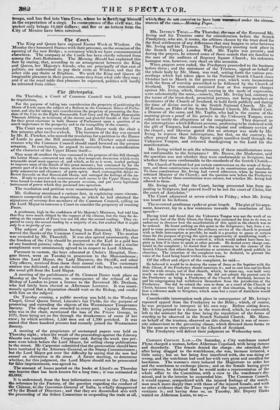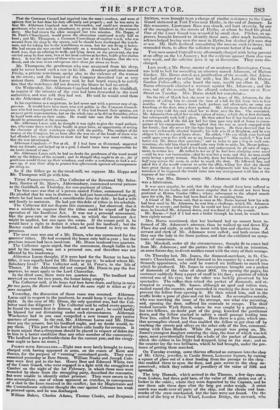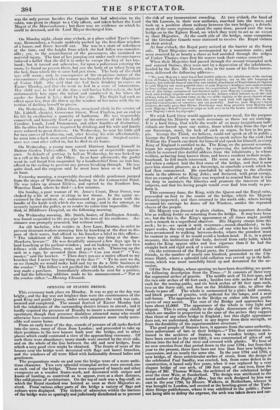That the Comraon.Council had inquired into the luau's conduct, and
were of opinion that he had done his duty efficiently and properly ; and he was sorry to hear Mr. Alderman. Copeland was at Newmarket, and could not examine the gentlemen who were now in attendance, to prove the falsehood of the woman's story. She had sworn the affair occupied but two minutes. Mr. Hoppe, of St Paul's Churchyard, would prove the altercation continued nearly half an hour; and Mr. Thompson, a Common Councilman of another waid, who was aroused from his sleep hy the uproar, said he should have discharged the watch- man, not for taking her to the watchhouse so soon, but for not doing it before. She had sworn she was carried indecently on a watchman's back. Now the truth was, that on refusing to walk, and lying down on the pavement, she was carried away by four men, two at her head and two at her feet, holdit.g her clothes down. It was the opinion of those who saw her at the Compter, that she was drunk, and she was in an outrageous state there for above an hour.
Mr. Thompson, the gentleman who was awakened from his sleep, said he never heard such a row in his life. Another gentleman named Frisby, a private watchman, spoke also to the violence of the woman in the street; and the keeper of the Compter described 1.er as very violent there. Alderman Lucas said, lie bad heard enough to satisfy him that the watchman did not deserve the blame he had incurred.
On Wednesday, Mr. Alderman Copeland looked in at the Guildhall, to inquire if the minutes of the case had been forwarded to the ward authorities, and was told they had not. He said. he would send them to the Alderman of the ward— In his experience as a magistrate, he bad never met with a grosser case of op- pression. It would have been more wise and politic in the Common Council- men who had investigated the complaint, if they had formed their opinion, not on an ex parte representation, but on the whole case as he did on Saturday, when be heard both sides on their oaths. He would take care that the watchman should be prosecuted at the sessions.
Mr. Alderman Lucas said, he thought it was right to give the ward authori- ties, who came down with their beadle in great force, an opportunity of setting the character of their watchmen right with the public. The conduct of the woman at the Compter, for an hour after she was out of the hands of those who had offended her, was sufficient to show that her temper was most violent, or that she was intoxicated.
Alderman Copeland—" Not at all. If I had been so ill-treated, separated from my friends, and locked up in a gaol, I should have been unappeasable for six hours instead of one."
Mr. Alderman Lucas said, he had no doubt the gentlemen of the ward would take up the defence of the accused ; and he thought they ought to do so; for if gentlemen would throw up their windows, and order a watchman to lock a wo- 7711114 up, it was their duty to protect him afterwards against all consequences for doing so.
So if the fellow go to the tread-mill, we suppose Mr. Hoppe and Mr. Thompson will go with him.
TITHE PROSECUTIONS.—The Collector of the Reverend Mr. Salus- bury, Rector of St. Mary's, Aldermanbury, summoned several persons to the Guildhall, on Thursday, for non-payment of tithes.
The first case was that of a person named Fisher, summoned for 3/. He pleaded that he was in distress : he had just been released from gaol, where be had been confined a considerable time for debt : he had a wife and family to maintain. He had put this debt of tithes in his schedule. The Collector did not dispute this statement ; but observed, that it was a mistake to suppose that the tithes could be wiped off by the operation of the Insolvent Act. It was not a personal assessment, like the poor-rate or the church-rate, to which the Insolvent Act might be applied, but one upon the estate. If the tenant paid it, he would have a right to deduct it when he paid his landlord ; but the Rector could not follow the landlord, and was bound to levy on the premises. The next case was one of a Mr. Dixon, who was summoned for five quarters' tithes. He had occupied the house only half-a-year ; but the previous tenant had been insolvent. Mr. Dixon tendered two quarters. The Collector again urged, that the assessment, though liable to be paid by the tenant, was not a personal one, and therefore was not affected by his insolvency.
Alderman Lucas thought, if it were hard for the Rector to lose his tithe, it was equally hard for Mr. Dixon to pay it : he asked where Mr. Salusbury lived? The Collector said, at St. Peter's, in the Isle of i'hanet. If the Alderman did not compel Mr. Dixon to pay the five quarters, he must apply to the Lord Chancellor.
In the third case, there were ten quarters due. The landlord bad received no rent for two years, the house being empty.
The Collector said, if the house had been burnt down, and lying in ruins for two years, the Rector would lave had the same right to tithes as if it were occupied.
Yesterday, the discussion of these cases was resumed. Alderman Lucas said in respect to the insolvent, he would keep it open for a fort- night. In the case of Mr. Dixon, the only question was, had the Col- lector used due diligence ? The Collector said he called every quarter; he found the tenant first in distress, and next in gaol ; he could hardly be blamed for not distraining under such circumstances. Alderman Winchester had in one case compelled a new tenant to pay twelve quarters of arrear. In the end, Mr. Alderman Lucas said Mr. Dixon must pay the arrears, but his landlord might, and no doubt would, re- pay them. [This part of the law of tithes calls loudly for revision. It is most unjust theta clergyman should be placed in respect of debts due
to him in a better condition than any other member of the community. The landlord has a preferable claim for the current year, and the clergy- man ought to have no more.] FIGHTS WITH SMUGGLERS.—Eight men were lately brought to town, charged with having appeared. in arms, on the coasts o Kent and Sussex, for the purpose of "running" contraband goods. They were examined yesterday at Bow Street. William Noaks and Joseph Cole- man were first put to the bar. Henry Best and Edmund White, two of the Coast Guard, who were engaged in a fight with the smugglers at Camber on the night of the 1st February, in which three men were wounded by shots from the smuggling party, described the rencontre, but were unable to identify either prisoner. They were sworn to by two accomplices ; one of whom appeared on crutches, in consequence . of a shot in the knee received in the conflict; but the Magistrates and the Customhouse solicitor thought the case against Coleman too weak to proceed upon, and he wasAiseharged.
William Baker, Charles Adams, Thomas Cloake, and Benjamin Stritton, were brought in on a charge of similar resistance to the Coast Guard stationed at Fort Twiss near Hythe, in the end of January. In this rencontre, Lieutenant Ross was struck, and hurt severely, by one of the smugglers in the streets of Hythe, at whom he fired his pistol.
One of the Coast Guard was wounded by small shot. Filcher, an ap- prover, brought forward to identify these men, after much hesitation,
acknowledged having seen the men in Hythe, but doubted fit were they or not. Mr. Halls declined committing the men on such evidence, but remanded them, to allow the solicitor to procure better if he could.
Two men named Guttsall were afterwards charged with being present at an affray on the 1st January; but the evidence against them also was very weak, and the solicitor gave it up at discretion. They were dis- charged.
Last week, a Mr. Burns, master of an academy at Kennington Cross, was held to bail for assaulting an attorney named Adamson, of Hatton Garden. Mr. Burns stated, as a justification of the assault, that Adam- son had attempted to seduce his wife ; but Mr. Laing, of the Hatton Garden Police-office, who heard the case, would not allow it. Mr. Burns afterwards obtained a warrant against Mr. Adamson ; and the ease, not of the assault, but the alleged seduction, came on at Bow Street on Tuesday. Mrs. Burns stated her complaint— On the 8th of March last, she went to the house of Mr. Adamson, for the purpose of asking him to extend the time of a bill for 231. from two to four months. She wits shown into a back parlour, and afterwards, on some one knocking at the door, into a front parlour. Mr. Adamson then observed, that it was a very cold day, and asked her to draw near the fire. She consented. Mr. Adamson then asked her to take a glass of wine; which she at first declined, but subsequently took half a glass. He then asked her if her husband was not a cross man, and if she did not feel her time pass very dull at home in come- quence of his engagements. She replied that she was so much engaged with her family, that she never felt the time hang heavy. He then observed that he was very awkwardly situated himself; his wife was ill at Brighton, and he was obliged to live in a great house alone. He added, "Du you think your husbruad could spare you to live with me as my housekeeper ? " you replied, " You had better ask Mr. Burns that question ;" and in order to put a stop to such con- versation, she told him that it would take very little to make Mr. Burns jealous. Mr. Adamson then laid hold of her hand, and endeavoured, by all sorts of argu- ment, to seduce her. He talked to her as if he had been studying some novel —said he was not immaculate—that he was but a man, and that no man could resist loving a pretty woman. She forcibly drew her hand from his, and jumped half way across the room, in order to reach the door. He followed her, and asked her if she would consent to settle the affair, telling her that she diould have great things at her command ; but she indignantly told him that he was mistaken if he supposed she would enter into any arrangement with him at the expense of her virtue.
This was Mrs. Burns's story. Mr. .Adamson said the whole story was a fabrication.
It was most singular, he said, that the charge should have been suffered to stand over for six weeks, and still more singular that it should not have been preferred at Hatton Garden Office; where, subsequent to the alleged assault upon his wife, Mr. Burns had been fined at for assaulting him. A friend of Mr. Burns said, that as soon as Mr. Burns learned how his wife had been used by Mr. Adamson, lie sent him a challenge, which Mr. Adamson declined to accept ; and finding that he could not have satisfaction as a gentle- man, he knocked Mr. Adamson down, and was fined 51. for the assault.
dr. Burns—" And if I had sent a bullet through his head, he would have been rightly served."
Mrs. Burns mentioned, that her husband had no sooner been in- formed of Mr. Adamson's attempt, than he walked up and down Ely Place day and night, in order to meet with him and chastise him. A servant and clerk of Mr. Adamson were called ; and both swore that they saw the lady in the front parlour, and that she exhibited no symp- toms of uneasiness.
Mr. Minshull, under all the circumstances, thought fit to exact bail from Mr. Adamson; and "the parties left the office with an intention, on some future day, to divert another court with the story of their wrongs.
On Thursday last, Mr. Isaacs, the diamond-merchant, in St. Cle- ment's Churchyard, was called forward to his counter by a man of gen- tlemanly appearance, who said he wanted six brilliants to match two which he produced. Mr. Isaacs in consequence brought out a packet of diamonds of the value of about 3001. On opening the paper, his customer suddenly flung a paper of snuff in his face ; a portion of which entered one of his eyes, but the other was luckily preserved by his spectacles. The ruffian then seized the packet of diamonds, and at- tempted to escape. Mr. Isaacs, although an aged and infirm man, rushed round the counter, and succeeded in reaching the door in time to prevent the fellow from opening it. He then seized him, and in the
scuffle broke a pane of glass and cut his hand. An accomplice outside, who was watching the issue of the attempt, saw what was occurring, and, opening the door, suffered his comrade to escape. The thief rushed towards Wych Street, where he was caught by a gentleman ; but two fellows, no doubt part of the gang, knocked the gentleman down, and the fellow reached in safety a small passage leading into New Inn, called New Inn Passage. Here there is a gate, which ano- ther accomplice closed, and thus enabled the fellow to get clear off by reaching the streets and alleys on the other side of the Inn, communi- cating with Clare Market. While the pursuit was going on, Mr. Isaacs's youngest daughter entering the shop, the door of which was left open, most providentially found the whole of the packet of diamonds, which the robber in his fright had dropped, lying on the mat; and on the counter lay the two brilliants, which he had brought, under the pre- tence of getting them matched.
On Tuesday evening, some thieves effected an entrance into the shop of Mr. Chitty, jeweller, in Castle Street, Leicester Square, by cutting a square of glass out of a door leading from the passage to the shop : this enabled them to open the door, and gain access to the shop un- perceived; which they robbed . of jewellery of the value of 1001. and upwards.
The brig Hannah, which arrived in the Thames, a few days since, from Lisbon, had three gold bars, of the value of 3001. stolen out of a locker in the cabin ; where they were deposited by the Captain, and be saw them safe three days after the brig got under weigh. A strict search was made over all parts of the ship, and the chests and ham- mocks of the crew overhauled, but the bars were not found. On the arrival of the brig at Fresh Wharf, London Bridge, the steward, who
was the only person besides the Captain that had admission to the cabin, was given in charge to a City officer, and taken before the Lord Mayor at the Mansionhouse ; but there was no evidence on which he could be detained, and the Lord Mayor discharged him.




























 Previous page
Previous page